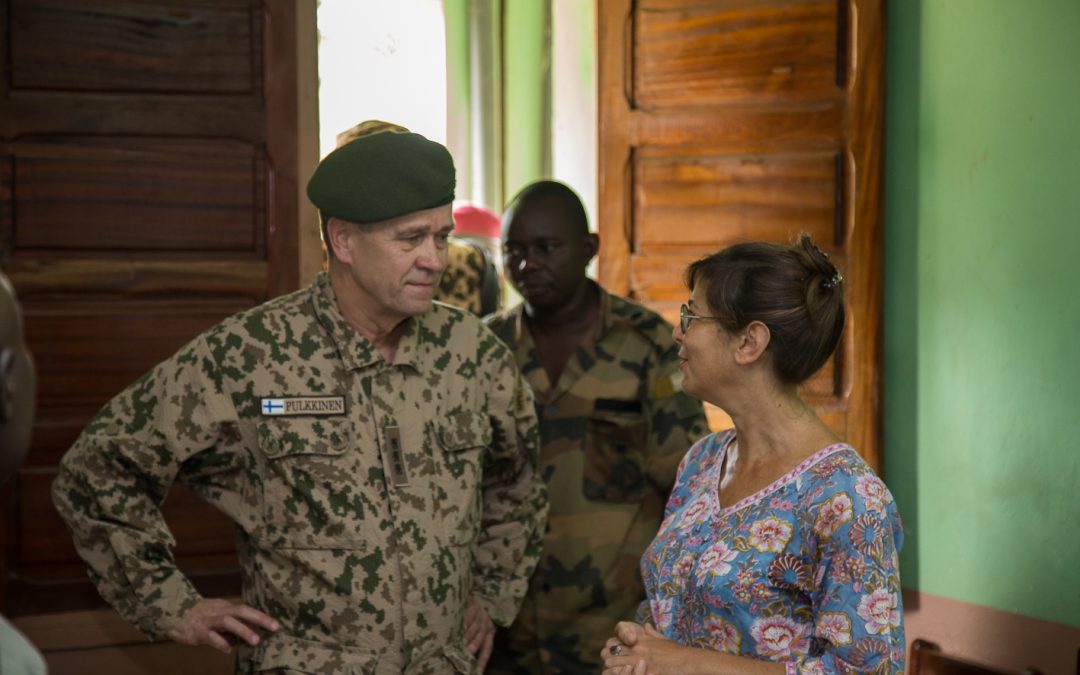
by Cynthia Petrigh | May 15, 2018 | OurWork
At beyond peace, we believe policy work is based on field experience and on lessons learnt while working with others. We see it as our role to share with the community of practitioners, and also to share findings, concerns and updates with donors and decision-makers. We are highlighting hereafter some recent events were we were able to disseminate some of our field-based evidence and reflections.
From 26-28 February 2018, we conducted in Brussels a high-level debrief to share our lessons from CAR.
After working for 6 months with the EUTM CAR on improving the FACA behaviour through training on IHL and prevention of sexual violence, we gathered a number of learnings on how EU CSDP missions could be improved. We identified that these missions lack selection standards for their staff; there was no EU pre-deployment training (training is left to nations, as is the case with peacekeepers, with the shortcomings we are familiar with); there was no gender adviser although this is an olbigation in CSDP policy; there were no women in command positions. There was no context analysis conducted, which means that the training is pretty much theoretical and not adapted to the context – with as a result a limited impact. We shared these observations with the EEAS Deputy Secretary General, with the MPCC Chief of Staff, with the NATO Ambassadors and with civil society through the European Peacebuilding Liaison Office (EPLO). We recommend that the MPCC adopts the following reforms for CSDP missions:
- include a gender dimension from the design phase, including through the deployment of a genad
- include training on IHL and PSV as a standard component of EU CSDP training missions
- prepare deploying staff through training on the context, the political and cultural dimension, the legal environment and the gender dimension
- monitor closely these aspects from Brussels level.
Our findings and recommendations will be shared in a workshop titled ‘Gender, Security and Justice in the EU Foreign and Security Policy. Tangible Transformations or Contentious Continuities?’ which will take place on the 18th and 19th of October 2018 in the National University of Ireland, Dublin, Ireland and is organised by the UCD School of Politics and International Relations.
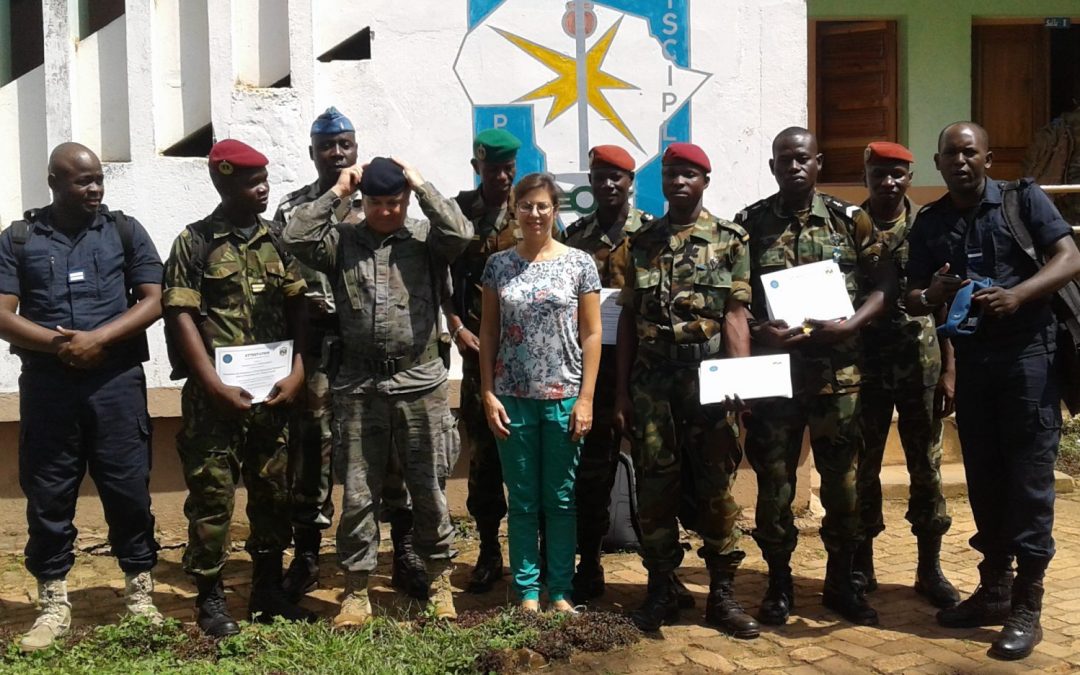
by Cynthia Petrigh | Dec 2, 2017 | OurWork
This story was updated on 4 January 2018
Beyond peace completed its pilot project in Central Africa, aiming at training the Central African Armed forces (FACA) on International humanitarian law (IHL) and prevention of sexual violence. The project was implemented through a partnership with the EU training mission (EUTM) in CAR with the support of UK government. Time has come to reflect on our work and what comes next.
Six months after deployment, we were able to successfully design and establish the component. We have trained some 900 personnel: 1 infantry battalion, Officers on Leadership courses, NCOs, specialised staff (platoon Commander course; Intel course; CAT 2 course); former insurgents and instructors.
Our training is based on a contextual analysis and it is tailored to the audience and to the operational, legal and cultural context. It utilises a comprehensive methodology: lectures, questions/answers sessions, group work, videos, dialogue and exchanges. The rules learnt through this interactive methodology are then practiced during combined tactical exercises. Progress is measured through the completion of a questionnaire, before and after the training.
Below are some of the stories and the people behind this training project.
- Infantry Battalion
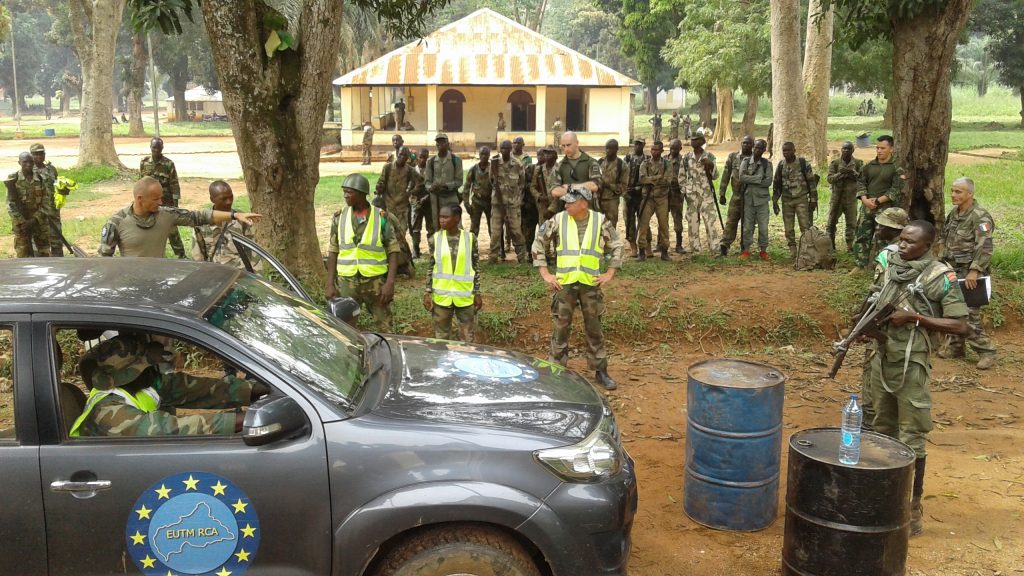 Photo: joint checkpoint exercise where the FACA learn about securing and respecting human rights
Photo: joint checkpoint exercise where the FACA learn about securing and respecting human rights
We have trained the 2 Companies of Infantry Battalion 1, currently trained by the EUTM. In addition to classroom sessions, group work and “sandbox” exercises, we were able to introduce a new tool through joint, IHL-military tactical exercises. All four Companies of BIT 1 participated in the exercise. We held briefing sessions with the Battalion Officers and the General Staff.
At the question “what did you learn from this training?”, a Corporal answers: “we are learning the difference between a professional military and bandits”.
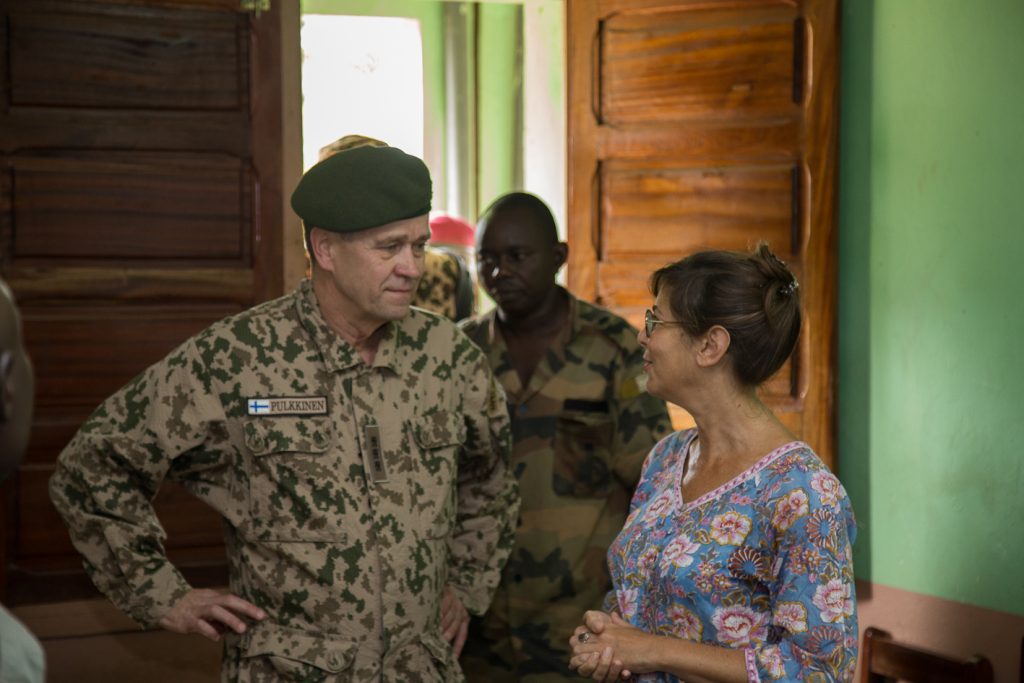
Photo: MPCC Director LGen Pulkkinen visits our class in Camp Kasai
“Your tactical exercises are adapted to our realities. You know our dilemmas and you are really here to support us”, says a Sergeant.
2. The former insurgents
Beyond peace contributed to the training of 100 former insurgents who have joined the Central African Armed forces (FACA) as part of the Demobilization, Disarmament, Rehabilitation and Repatriation (DDRR) project. The President’s initiative, which was joined by the armed groups and endorsed by the international community, provides a sign of hope and dialogue across the conflict divide.
We worked first, in October, with the 10 Officers and NCOs in charge of supervising the new recruits. In November, we started training the team of 100, with their support.
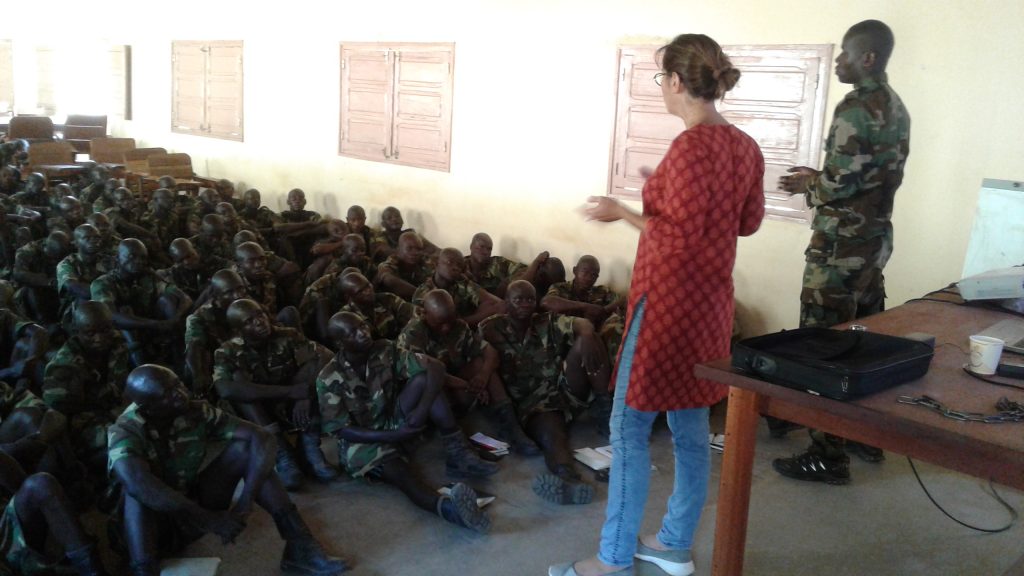
Photo: Movie session with the 100 DDRR former insurgents, December 2017
The former insurgents come form various rebel groups; they belong to different religious backgrounds; about 10% are female. They display an incredible willingness to learn and to amend their lives. This morning, I was showing videos about conflict-related sexual violence, in CAR and in other countries. One of them raised their hand: “We have our share in what happened, he said. But now that we are being educated and we understand our duties, we will not do it anymore. We will protect women against this crime. We will report abuse.”
As for the other members of the armed forces, the course looks at the basic principles of IHL (such as: distinction, proportionality, precaution); the protected persons and sites; the need to protect and respect women; the prohibition of torture, arson, pillage, rape; the treatment of prisoners; the roles of duties of military and criminal and military sanction processes.
3. Educating Officers
We contributed to the 2 Leadership training courses organised this semester by the Central African MOD in partnership with the EUTM. Some 65 Lieutenants educated abroad benefitted from these courses and learnt and shared about their duties and responsibilities as FACA. “We learnt that we cannot rape. We never knew that”, said one of the Officers.
“We learnt that when an operation is likely to result in failure and in a massacre, we should postpone it and better prepare it”, said another Lieutenant. “I had never thought of that. We are learning”.
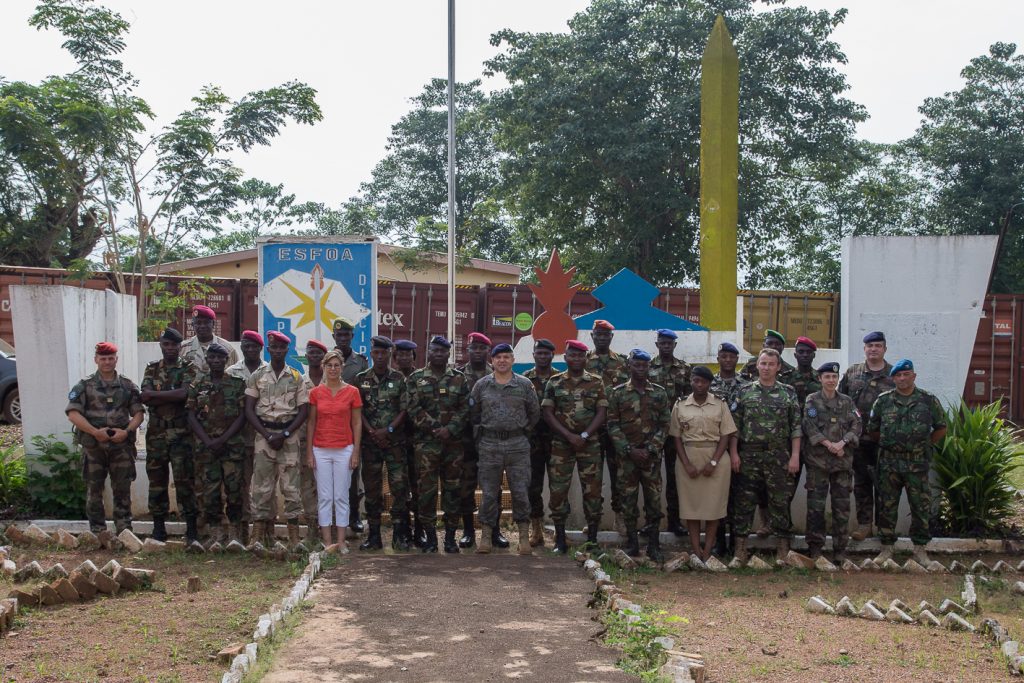
Group photo for the Graduation of 2nd Leadership course for Officers, November 2017
4. Platoon Commanders’ Course
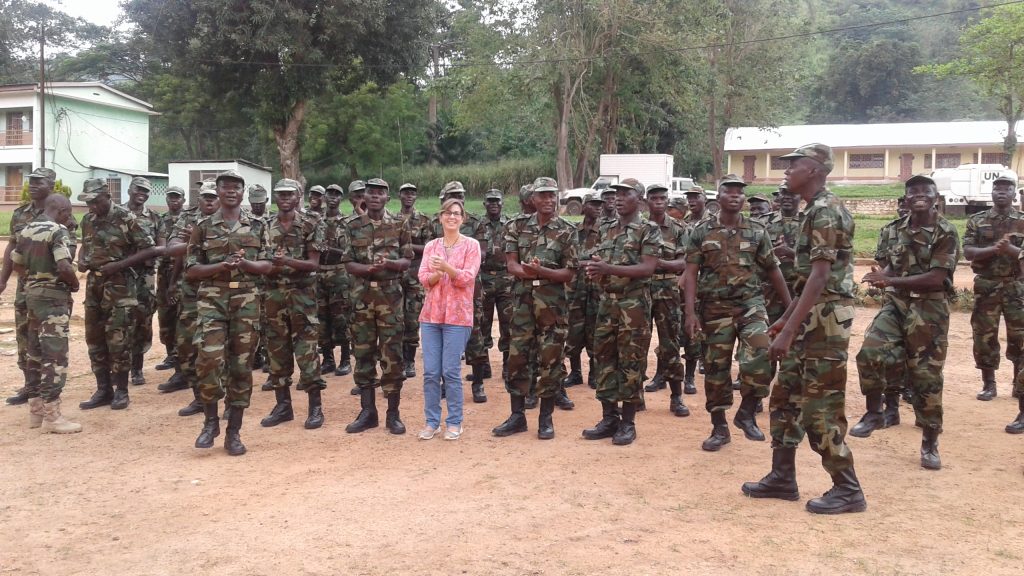
Photo: BA2 Platoon Commander course participants receive their uniform shoulder loops
We co-facilitated this 12-week course together with Lieutenant Zandanga from the FACA. It was a wonderful experience and a privilege to work along such a skilled and committed instructor.
“We love this course because of its unique methodology. We learnt a lot and it’s fun”, said one participant.
5. Train the trainers
As much as this pilot project is successful, it has its limitations because it is a private initiative, limited in time. In order to ensure some degree of sustainability to our project, and in recognition of the great capacities and cooperation from the Central African military, we have trained 8 new IHL/PSV instructors. We benefitted from the outstanding support from UN OCHA and from the FACA through Lieutenant Zandanga for this activity.
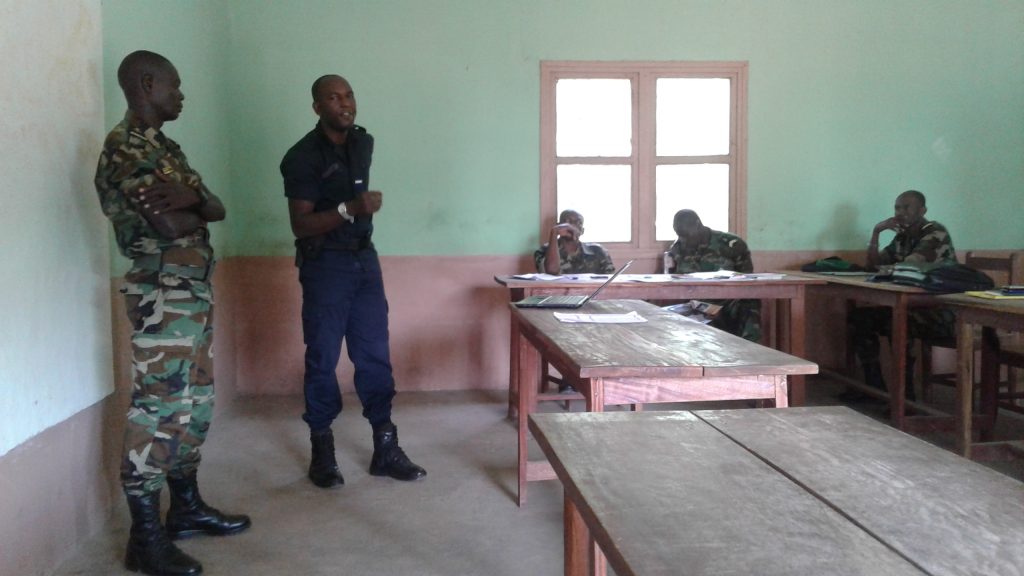
Photo: Lieutenants Dikossou and Lapo delivering a training on Protection of women and prevention of sexual violence: “women are the pillars of society; we, military, have to protect them”.
We can certify that these instructors are competent and committed and we wish them all the best in their new assignments as instructors.
6. What next?
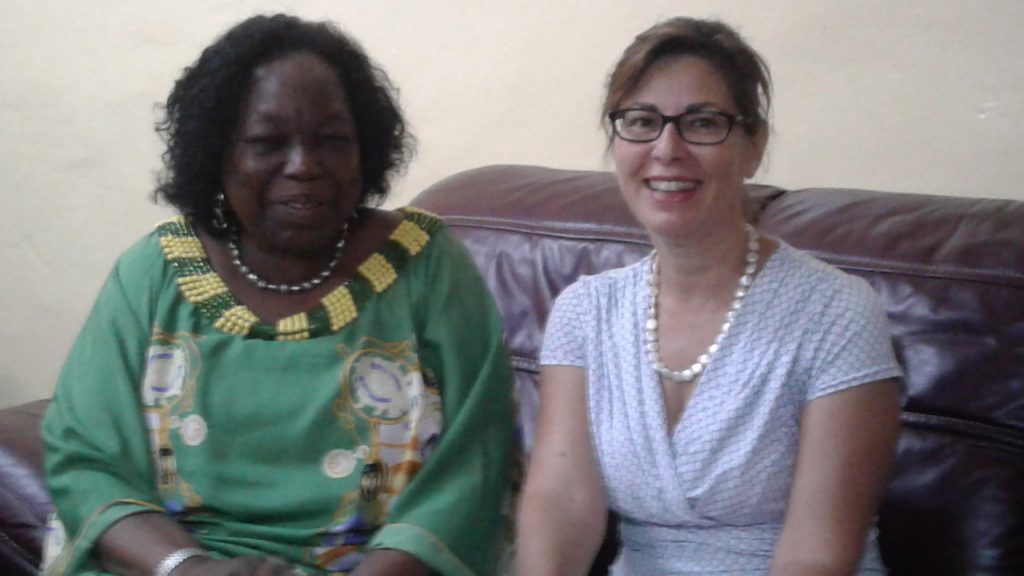
The Minister of Defense granted us two private audiences and in December expressed the wish that Beyond peace continues training the FACA. “Our military need to improve their behaviour before they are deployed. What you bare doing is essential and successful.”
We were privileged to receive wonderful support from the highest authorities and excellent cooperation from the FACA. The President of National Assembly received us on 21 December and also extended his support: “I congratulate you. You are an experienced woman. Your approach is the best we can have in this situation. Without ethics, we train brutes”.
The pilot project is a success. It was designed and managed by Beyond peace, thanks to the endorsement from the highest CAR authorities and support from the UK Government. What would be needed to systematise this component in EU CSDP missions? We will be holding a series of meetings early in the new year in order to share ideas and findings to this effect. Contact us if you would like to participate – or to host such a meeting.
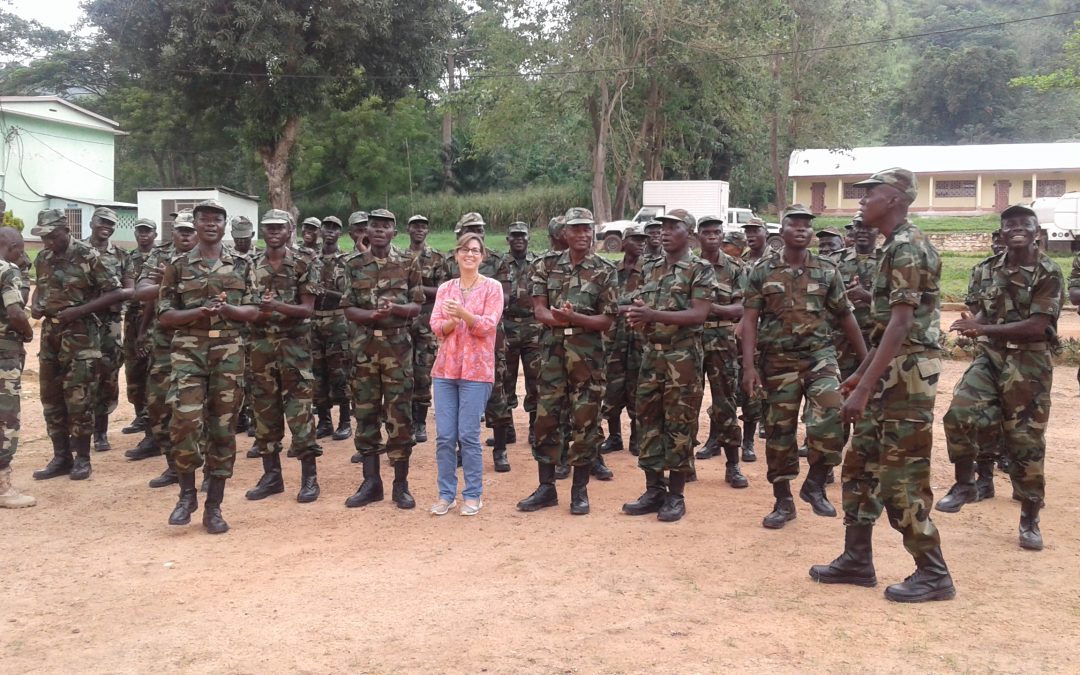
by Cynthia Petrigh | Oct 6, 2017 | Info, OurWork
Beyond peace was invited by the Central African Ministry of Defense and the EU training mission in CAR (EUTM) to contribute to the training of 60 former combatants who will be integrated in the armed forces as well as their 10 FACA supervisors, in the context of the Disarmament, Demobilisation, Rehabilitation and Repatriation (DDRR) pilot.
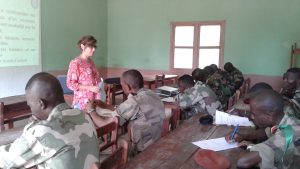
A class with the 10 Officers and NCOs who will be supervising the former Non-State Armed Groups combatants, focusing on leadership, command responsability and respect for IHL
In addition to the DDRR pilot, Beyond peace is continuing its training activities for the 1st Battalion (3rd Company and Fire support platoons) soldiers, NCOs and Officers and for selected Officers and Officers of other units.
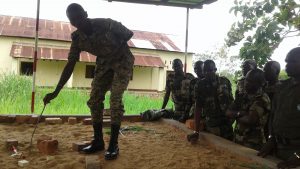 Photo: A Lieutenant participating in the Leadership Seminar for Young Lieutenants demonstrating how his platoons will perform a tactical operation respecting IHL.
Photo: A Lieutenant participating in the Leadership Seminar for Young Lieutenants demonstrating how his platoons will perform a tactical operation respecting IHL.
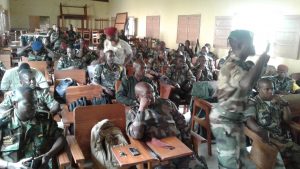 Photo: The 43 Young Lieutenants on their graduation ceremony
Photo: The 43 Young Lieutenants on their graduation ceremony
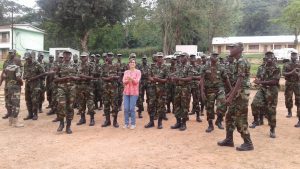 With the NCOS participating in the special training for future platoon Commanders
With the NCOS participating in the special training for future platoon Commanders
In November, Beyond peace will start implementing Train the Trainers activities in order to build the training capacities of the FACA on IHL.
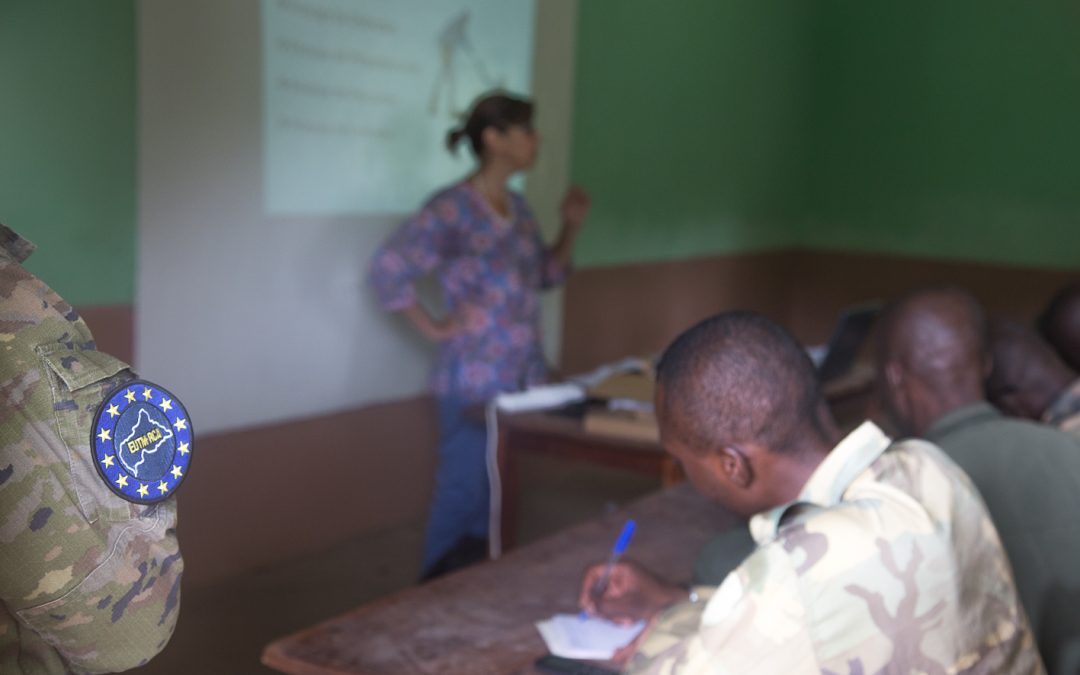
by Cynthia Petrigh | Aug 19, 2017 | OurWork
Beyond peace started today its training on IHL and prevention of sexual violence for the Central African armed forces (FACA) on behalf of EUTM, the EU training mission in CAR.
Over 30 Officers from BIT 1 received a first instruction, as well as 41 NCOs from other units.
Based in Bangui and deployed upon the request of the Transition President, the EUTM RCA is contributing to rebuilding a modernised, effective, inclusive and democratically accountable Central African Armed Forces (FACA). It provides strategic advice to the Central African Republic’s Ministry of Defence and the general staff, as well as education to officers and non-commissioned officers, and training to the FACA.
Beyond peace established a partnership with the mission, with the approval of the EU External Action service and with the support of UK Government. The objective is to integrate the training component on behaviour into all training delivered by the EUTM for the FACA over a 6-month pilot period. Our Director Cynthia Petrigh arrived in Bangui on 7 July 2017 to design and develop the programme; she will be joined by other experienced trainers.
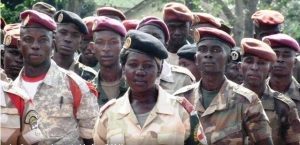
by Cynthia Petrigh | Jun 7, 2017 | Info
We are currently setting-up the training on international humanitarian law (IHL) and PSV for the Central African armed forces (FACA), in cooperation with the European Union Training Mission (EUTM) in Bangui.

The objective of this project is to improve the behaviour of the Central African armed forces (FACA) by integrating International humanitarian law (IHL) and prevention of sexual violence (PSV) in the training delivered by the EUTM Bangui
After the eruption of the conflict in CAR in 2013 that saw widespread sexual violence against civilians, the country is undergoing an internationally supervised transition, including the deployment of the MINUSCA and of an EU CSDP military training mission (EUTM RCA). During the crisis, the Central African Armed Forces (FACA) were largely inefficient. The population considers that they failed to protect them and that they participated in the extra-judicial killings, the rapes and looting. In spite of the past misbehaviour, the deployment of FACA would be welcomed as the only symbol of state presence. But for that to be successful, the FACA would need to improve their capacities and especially their behaviour.
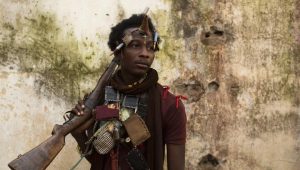
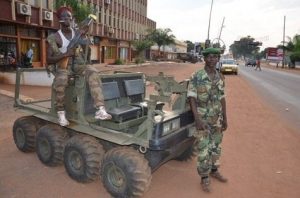 Members of the non-state armed groups during the 2013 – 2014 violence
Members of the non-state armed groups during the 2013 – 2014 violence
Beyond peace intends to establish the training programme, by:
– conducting an applicable law analysis (instruments ratified by the CAR; national law, criminal procedure) in relation with the conflict and mainly the duties, obligations and limitations for the FACA
– conducting a contextual analysis (cultural aspects, religious and ethnic dimension possibly affecting training and behaviour; relation to power and authorities; learning and problem-solving traditions ; main weaknesses of FACA with regards behaviour; tactical environment
– designing training material that makes sense to FACA trainees and is adapted to CAR context.
The training, which will be integrated in the EUTM official training programme, will include: lectures for Commanders (including Command responsibility) and for troops (mainly based on Do’s and Don’ts), tactical exercises and assessment tools. Beyond peace has been working pro bono on this project for the past year. Thanks to the trust of the UK Embassy in Kinshasa and of the EUTM, Beyond peace will start the pilot project implementation as of July 2017.
Follow our news and subscribe to our newsletter for updates.


















